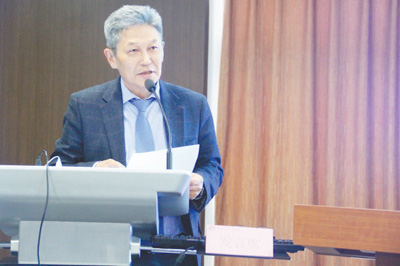


Photo courtesy of Confucius Institute at National University of Mongolia
When Chimedtseye Menerel, Mongolian director of Confucius Institute at National University of Mongolia, firstly arrived in China for Chinese studies at Beijing Language and Culture University in 1986, he could probably have envisioned his future closely bonded with the Chinese language, culture and literature.
Chimedtseye, also secretary-general of China-Mongolia Friendship Association, has spent nearly three decades on the translation of the Chinese classics collection Four Books into Mongolian. Now, he is about to complete his works.
“The translation is my gift for the 70th anniversary of the establishment of diplomatic ties between Mongolia and China,” he said in a recent interview with People’s Daily.
Chimedtseye started studying Confucianism, the teachings of the Chinese philosopher Confucius, in the 1990s, and was soon attracted by the charm of the philosophy, he introduced. This experience later inspired him to translate the Four Books into Mongolian.
He firstly started from the Analects, a collection of sayings and ideas attributed to Confucius and his contemporaries in the Four Books. Taking him seven years to finish, the Mongolian version of the Analects has been reprinted for five times after its initial publication in 2004.
“I need to understand the Chinese classics myself if I want Mongolians to understand.” Upholding such a principle, he started translating the Chinese military treatise the Art of War. In order to be precise enough, he referred to 12 Chinese versions of the Art of War published by different publishing houses, as well as English-Chinese bilingual editions.
So far, Chimedtseye’s works have been collected by the Mongolian national library and adopted by multiple colleges and universities as a compulsory course.
Except for translating the Chinese classics, Chimedtseye has been running between China and Mongolia for academic conferences and social activities to push forward bilateral cultural exchanges.
He believes that the Confucius Institute at the National University of Mongolia, serving as an important platform for language teaching, has played a significant role in deepening Mongolia-China cultural exchanges and has become a bridge between the two peoples.
“China’s development has brought significant opportunities for all other countries in the world, especially its neighboring countries. I wish for a new chapter of Mongolia-China friendly cooperation,” he added.
 Fire brigade in Shanghai holds group wedding
Fire brigade in Shanghai holds group wedding Tourists enjoy ice sculptures in Datan Town, north China
Tourists enjoy ice sculptures in Datan Town, north China Sunset scenery of Dayan Pagoda in Xi'an
Sunset scenery of Dayan Pagoda in Xi'an Tourists have fun at scenic spot in Nanlong Town, NW China
Tourists have fun at scenic spot in Nanlong Town, NW China Harbin attracts tourists by making best use of ice in winter
Harbin attracts tourists by making best use of ice in winter In pics: FIS Alpine Ski Women's World Cup Slalom
In pics: FIS Alpine Ski Women's World Cup Slalom Black-necked cranes rest at reservoir in Lhunzhub County, Lhasa
Black-necked cranes rest at reservoir in Lhunzhub County, Lhasa China's FAST telescope will be available to foreign scientists in April
China's FAST telescope will be available to foreign scientists in April "She power" plays indispensable role in poverty alleviation
"She power" plays indispensable role in poverty alleviation Top 10 world news events of People's Daily in 2020
Top 10 world news events of People's Daily in 2020 Top 10 China news events of People's Daily in 2020
Top 10 China news events of People's Daily in 2020 Top 10 media buzzwords of 2020
Top 10 media buzzwords of 2020 Year-ender:10 major tourism stories of 2020
Year-ender:10 major tourism stories of 2020 No interference in Venezuelan issues
No interference in Venezuelan issues
 Biz prepares for trade spat
Biz prepares for trade spat
 Broadcasting Continent
Broadcasting Continent Australia wins Chinese CEOs as US loses
Australia wins Chinese CEOs as US loses